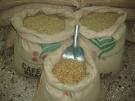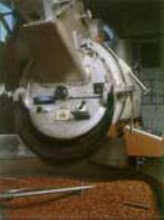Colombian coffee growers face tough year
 Some coffee growers are turning to alternative uses of their land
Some coffee growers are turning to alternative uses of their land In the mountainous region of Caldas, the heart of Colombia's coffee belt, farmer Manuel Villegas gazes out at the steep slopes of the Andes.
"All of this used to be coffee," he says, pointing to miles of hilly farmland. "Now it is pasture, avocados, oranges - coffee just isn't as profitable as it was before."Mr Villegas, who manages eight coffee plantations in the town of Palestina, saw a 40% drop in production in 2009.
"Last year's harvest was better because we had less rain in January and February, but now there is so much rain there won't be enough flowering for September's harvest," he says.
Colombia is the second largest producer of hand-picked Arabica coffee after Brazil, but extreme weather fluctuations have taken their toll on the country's coffee growers.
Drought brought production to a 33-year low of 7.8 million bags, each weighing 60kg (130lb) in 2009, and in the past few month, heavy rains - which could last until April - have disturbed the flowering cycle and brought insects and disease to coffee plantations.
"We need a few weeks of dry weather so we can have flowering - if there is no flowering, there is no coffee," says Luis Fernando Samper of the Colombian Coffee Growers Federation.
"We had 8.9 million bags for 2010. Under normal conditions, Colombia produces between 11 million and 12 million bags."
Devastation Heavy rains and flooding in recent months have affected some two million people. More than 300 people have died, thousands of homes have been destroyed, and 1.3 million hectares of land (5,019 sq miles) were submerged. Damages are put at $5.2bn (£3.3bn).
 Some parts of Colombia have seen weeks of flooding
Some parts of Colombia have seen weeks of flooding "This is the worst catastrophe to hit farms in Colombia, because it is not only the flooding, but also the diseases that are spreading all over the crops," says Silvia Restrepo, head of the biology department at the University of the Andes in Bogota.
Constant humidity has triggered the spread of fungus on crops. Coffee, in particular, has suffered from an outbreak of coffee leaf rust, or roya as it is known. Roya attacks the leaves of Arabica plants with yellow-orange lesions, reducing yields and killing the plant if left untreated.
"Rust is getting to places that it didn't in the past, such as higher altitude plantations, because of rising temperatures. This is an effect of the climate patterns we are facing," says Mr Samper.
 Growers say the last few years have seen a big decline in production
Growers say the last few years have seen a big decline in production Broca infested up to 25% of farmer Juan Pablo Echeverri's crop in 2009-2010. His farm, Hacienda Venecia, near the city of Manizales lies at an altitude of 1,300m (4,265ft) where broca rarely reaches more than 5% of coffee plants.
"I have been in the coffee industry for four generations, and I don't remember having ever experienced a 25% broca infestation," says Mr Echeverri.
Speculation that crop diseases will affect global supply has led to a jump in coffee prices internationally - Arabica coffee futures for March closed at $2.406 (£1.50) per pound on ICE Futures US in New York, a 13-year high.
Coffee growers welcome the surge in prices, but many are cautious that demand could shift to other coffee-producing countries where it is cheaper to buy.
New crop Such challenges have led some farmers to look for alternatives to growing coffee.
David Velasquez's family has been in the coffee business for 100 years, but has started cultivating bananas and plantains at their farms near the city of Armenia.

But growing a new product on Colombia's mountainous terrain can be costly, says Mr Villegas. Other farmers have found a different solution.
Mr Echeverri started bringing tourists to Hacienda Venecia 18 months ago. Visitors are invited to take tours of the plantation and stay in a luxury guesthouse on the farm, where coffee lovers are treated to black roast on tap.
"For now it's a drop in the ocean (income-wise), but it is a promising drop," says Mr Echeverri. He now works with a roasting company and has some 5%-10% of his crop roasted. The coffee is then sold directly to cafes and hotel chains in Colombia's cities.
Such tactics can soften the blow of a poor harvest, but for many coffee growers the future remains as uncertain as the weather.
"I've been through very irregular cycles, but never such a big drop in coffee production as there has been in the last few years," says Mr Villegas. "It's impossible to do anything about the weather conditions - I can only pray."

 Athens Time
Athens Time









Δεν υπάρχουν σχόλια:
Δημοσίευση σχολίου